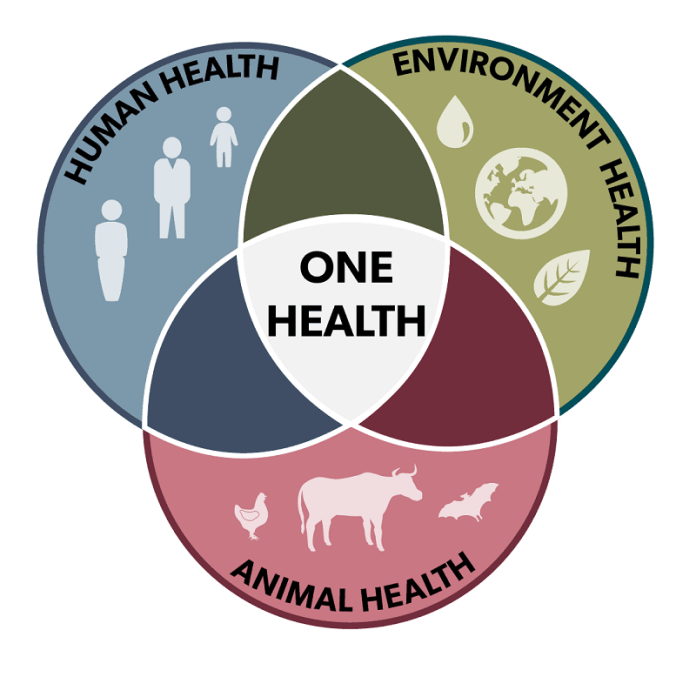A new initiative led by the United States Centers for Disease Control and Prevention (CDC) aims to achieve optimal global health outcomes recognizing the interconnections between people, animals, plants and their shared environment. Labeled ‘One Health for Global Health’, this is a collaborative, multisectoral, and transdisciplinary approach that works at the local, regional, and global levels.
According to the principles of One Health, humans are not isolated beings — we are integral parts of a much larger system. One needs to understand this bigger picture when preparing for action against threats near and far, from pandemics to global warming, climate change, natural disasters, and more. This holistic approach evaluates the interconnected nature of humans, animals, and environment through a wide range of disciplines and professions, and involves various stakeholders..
Studies show that over two thirds of the world’s infectious diseases are zoonotic, meaning that they originate in animals and spread to humans. Controlling the spread of zoonotic diseases improves the health and well-being of man and animals.Taking care of our environment by reducing, reusing, and recycling helps to minimize our negative impact on the planet, and lessen effects of climate change.
One Health represents different things to different people. For some, it symbolizes the human-animal bond (HAB), to others it also includes the environment. The relationship between pet and pet lovers provides a very visible example of the importance of One Health to individuals and pets. To understand this relationship one needs to look no further than the regular examinations and treatments that veterinarians recommend for pets.
These preventive measures protect pets and their human handlers. For example, veterinarians recommend monthly flea and heartworm preventatives for pets, because fleas and ticks carry diseases that can negatively affect the life of pets, and serve as carriers of various diseases that affect humans. Similarly, heartworms spread several intestinal parasites among pets, many of which are also contagious to people who come in contact with infected pets.
Scientific research recognizes that animal hosts are the primary transmitters for the spread of over 60 percent of all human infectious illnesses and the source of 75 percent of all up-and-coming contagious threats. These zoonotic diseases pose risks to humans and animals alike. Protecting our pets helps to protect ourselves. Some examples of zoonotic diseases are rabies, lyme disease, avian flu, plague, ebola, ringworm, anthrax. The COVID-19 pandemic, while devastating, has shown us how interconnected the world is, not just humans to humans but animals to humans and more.
Infectious diseases can have far-reaching effects, causing deaths, forced euthanasia of many animals, hospitalizations, and more. Illnesses that may not be contagious to humans but infect species in our food supply, can also negatively affect the food chain and lead to food shortages, higher-priced goods, hunger, and starvation.
Beyond human or animal issues, environmental and economic concerns, One Health issues have far-reaching implications including:
● Antimicrobial-resistant bugs, or organisms that do not respond to common medication, which are now being increasingly found in hospitals, nature, animals, and among people.
● Vector-borne diseases, or infectious ailments transmitted by ticks, fleas, mosquitoes, and other related species (vectors), such as West Nile Virus, Lyme disease, and Malaria.
● Food and water safety and security through protecting our food supply from diseases and spoilage by ensuring soil health and water safety by preventing toxic chemicals and farmland waste run-off from contaminating soil and waterways.
● Preserve wildlife and their habitats by ensuring that conservation of habitats is high on the agenda of local and governmental agencies.
As individuals we can take several ‘one Health’ steps to make a difference to global health. These include:
● Reduce, reuse, and recycle items to protect the environment, save money, preserve natural resources, and give back what we take from the Earth. We can donate
● Donate unused food to your local food bank or charity organization.
● Remove food waste by composting at home or sending your food waste to a local composting company.
● Recycle properly, as many areas now have local collections or drop off for paper, plastic, glass and other materials.Electronics and appliances often need to be picked up by a specific company.
● Prevent parasites by protecting your pets from infectious parasites with regular monthly preventatives.
● Vaccinate your pets and children for common infectious diseases. For example, distemper and parvovirus vaccinations effectively protect against disease in dogs. In people, measles, mumps, and rubella vaccinations (MMR) help protect against easily preventable but potentially deadly diseases.
● Clean up. Make sure you clean up after yourselves and your pets.
● Health checks. Get routine wellness checks for you and your family members (two and four-legged alike).
● Stay home. If you are sick, rest at home. If you have signs of illness, such as coughing, sneezing, fever, chills, or a rash — protect others by staying away.
● Practice proper hygiene. Wash your hands regularly and effectively, use sanitizer where necessary, make sure your body and clothes are clean and not transmitting bacteria from one area to another.
Recognizing the importance of ‘One Health’ and incorporating protective steps to protect not just humankind, but the natural and animal kingdom too is vital to a healthier world and critical to our survival.

















